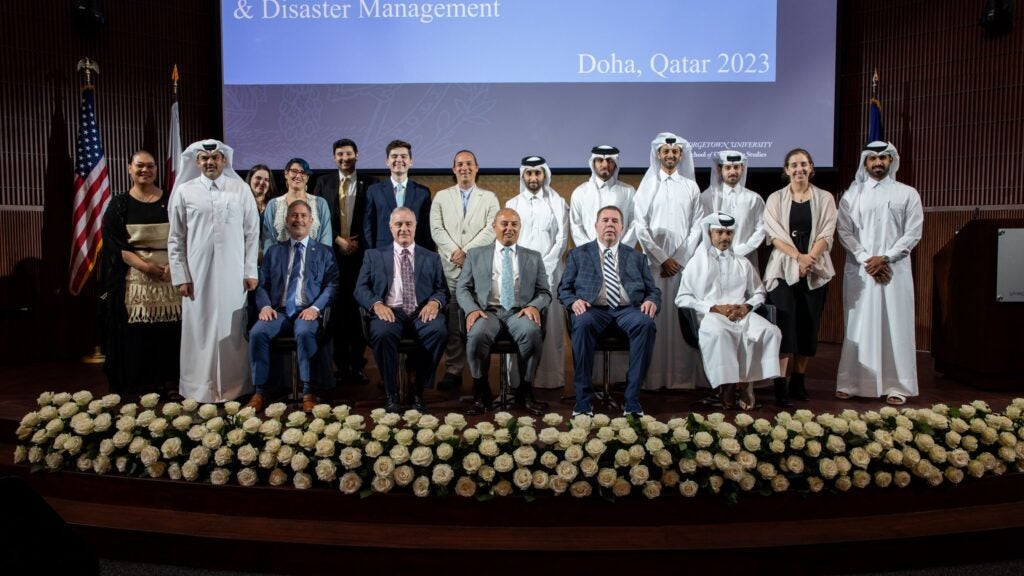IEDM Graduates Ready to Safeguard Communities Worldwide

A closing ceremony was held at Georgetown University in Qatar (GU-Q) to honor 12 graduates of the International Executive Master’s in Emergency and Disaster Management (IEDM) degree program for successfully learning what it takes to position themselves at the forefront of crisis planning and response.
The IEDM program is offered by Georgetown University’s School of Continuing Studies (SCS) in Washington, DC, in collaboration with GU-Q’s Office of Executive and Professional Education. The sixth cohort of graduates, comprising professionals from healthcare, law enforcement, and social services, have acquired essential skills and expertise in disaster preparedness and response through five intensive residencies in five countries, and immersive experiences and interactions with leading experts.
Attendees of the closing ceremony included friends, families, and representatives of the Qatari government, including H.E. the Minister of Education and Higher Education, Buthaina bint Ali Al Jabr Al Nuaimi.
Dr. Tim Frazier, faculty director for the IEDM program in DC, opened the event, saying: “Georgetown is indeed fortunate to have such intelligent and capable students in its program, and I know each of you will be amazing representatives of our great university as you move through life.”
In his remarks, the dean of GU-Q, Dr. Safwan Masri, said: “Your Master’s degree in Emergency and Disaster Management opens a new stage in your professional careers. The significance of this unparalleled qualification cannot be overstated. It stands for your capacity to protect and prevent, to help and save – when disaster strikes.”
Law enforcement and security expert Falah Al Dosari delivered a keynote address informed by his role as a senior manager with Project STADIA, an initiative by INTERPOL. His remarks highlighted the value of collaboration and foresight in achieving excellence in emergency and disaster management. During the ceremony, Al Dosari was also recognized for his continuous support of the program.
“By developing our people and communities, we equip ourselves with the tools to navigate through adversity and emerge stronger. In this pursuit, the partnership between INTERPOL and Georgetown University has played a pivotal role over the years, nurturing future leaders who are dedicated to safeguarding our societies.”
As part of the event, a student exhibit featuring capstone projects highlighted original research on key issues in global incident management, underscoring the essential role of emergency response education in ensuring community safety during disasters.
For Abdulla Alkaabi, a Fire Safety Engineer with the Qatar Civil Defense, the residency in Jordan which included a trip to the Za’atari Syrian refugee camp went beyond classroom learning to offer a hands-on look at the disaster management cycle.
“This program not only gave us an idea of much it takes to manage any given disaster, but also how to manage the situation after the disaster. Sheltering people isn’t enough, you have to work to make their lives better.”
Lavinia Clara Taumoepeau-Latu, a Fulbright scholar who has had experience working for the government of Tonga in response and recovery stages for Tropical Cyclone (TC) Gita which hit in 2018, presented her capstone project on contextualizing disaster management for district and town officers in Tonga.
“The residencies were excellent opportunities to gain new insight on how emergency management strategies and practices happen in various parts of the world,” she said.
Nasser AlSubaey, a first lieutenant software engineer in the National Command Center of the Ministry of the Interior, reflected on the importance of the learning outcomes for Qatar.
“In Qatar we host a lot of major events. We actually need to plan for any crisis or disaster that may happen during these events. This was one of the most important learning outcomes I took from this project.”
Graduate Katie Riddle presented research on emergency managers and their perceptions of climate change and the global environment. “This program has been an amazing experience and one I will cherish forever, not just for the education, but the amazing connections I made.”
Earning special recognition for their research, Hannah Ludes, a former team leader with AmeriCorps NCCC: FEMA Corps, won the Outstanding Capstone Impact Award for her work exploring Covid-19-related burnout in US nurses, and Emma Reynolds won the Outstanding Capstone Thesis Award for her exploration of the complex task of developing a capacity index for host states dealing with a refugee crisis impacted by climate change.
And IEDM Alumnus Faruk Azad, Assistant Executive Director of Business Development at Hamad Medical Corporation, was honored with the Alumni and Ambassador Extraordinaire Award for his contributions to the program.